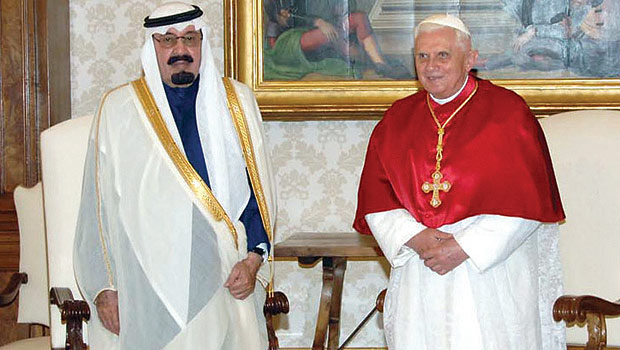The bilateral relations between Italy and Saudi Arabia are constantly expanding with great strides not only in trade but also in the political and intercultural spheres.
From a political point of view, both countries share the importance of promoting peace and stability in the Middle East and the integration of the economies of the Arabian Peninsula as well as that of the Kingdom in the world global economy. To this end, Italy has always displayed its firm commitment in support of the Kingdom’s efforts to join the WTO and the establishment a Free Trade Area (FTA) between the European Union and the GCC countries as well as other initiatives aimed at fighting international terrorism. From a cultural perspective the intercultural dialogue between the two countries remains a cornerstone, adding to the expanding cooperation in training and academic research.
In 2009, Saudi-Italian Commercial Exchange was affected by the international economic crisis and the consequent general reduction of the global trade exchange.
The first months of 2010 showed promising signs of recovery, attesting that the Saudi-Italian economic relations are build on strong and solid basis.
According to ISTAT, the Italian National Institute of Statistics, data for the year of 2010 shows a 31 percent growth in trade between Italy and Saudi Arabia comparing to 2009 (from 4.39 to 5.76 billions euro).
This growth is primarily due to the marked increase in the value of our imports, (+57.9 percent) and to the slight increase in our exports (+9.5 percent).
The sustained increase in our imports was determined by the increased value of imports of oil, natural gas and chemicals products (largely due to the increase in oil prices), which together represent over 90 percent of total imports. In particular, imports of oil and natural gas increased by 55.5 percent while those of chemical products has surged 66.3 percent.
Prominent growth was recorded among our exports of electrical equipment, nonelectric domestic appliances (13.8 percent) and chemicals (36.2 percent), even though they don't represent the core of our exports to Saudi Arabia.
Following the larger increase in our imports compared to the exports, the trade balance between the two countries in 2010 recorded a negative balance for Italy (-415.3 million) after the balance was positive in 2009.
The entry into force of the “Agreement to avoid double taxation,” signed in January 2007 by the then Italian Foreign Minister Dalia on his visit to the Kingdom, will further enhance bilateral commercial relations between both countries. Italy is ranked fifth biggest exporter to Saudi Arabia in both 2007 and 2008.
Since 1999, in addition to the significant increase of Italian imports from Saudi Arabia, different developments have strengthened Saudi-Italian economic and commercial ties, especially after the visit of the Custodian of the Two Holy Mosques King Abdullah to Rome.
The rich and the diverse cultural relations between the civilizations of Italy and the Arabian Peninsula can be traced back to the peaceful cooperation that existed between the Roman Empire and Nabatean civilization. Proof can be found in the rich archaeological findings both in Italy and the Arabian Peninsula. In conjunction with the commercial ties that are in place for a number of centuries between the southeast Mediterranean, the Red Sea and the land caravans, fruitful intercultural relations were often able to reconcile differences in cultural and religious identities involving the Italian maritime republics (Amalfi, Pisa, Genoa, and Venice) and the Arab merchants. Both sides had interest to obtain the advantage of such economic and cultural exchanges. All this is widely documented by the frequent accounts of travelers and by the rich archaeological findings on Islamic culture, including thousands of manuscripts many of which are preserved by Italian museums, libraries and archives.
Italian presence in the Gulf region is well documented as is the presence of Arabs in Italy, the latter starting from the extraordinary experience of the island of Sicily during the Arab Norman time. By means of bilateral cooperation on cultural themes both the government of the Republic of Italy and the Kingdom of Saudi Arabia intend to maintain this common tradition. Thus, in order to consolidate the importance of such endeavors the two countries are committed to develop initiatives of common cultural interest. For this reason, the Republic of Italy and the Kingdom of Saudi Arabia signed in 1973 a bilateral Cultural Agreement whereby Italy makes available a number of scholarships, the secondment of Italian language university lecturers to Jeddah and Riyadh as well as the funding of professional training programs to enhance the teaching capabilities of local Italian language lecturers and the supply of Italian teaching materials.
The Republic of Italy is also committed to finance specific cultural activities such as lectures and seminars held in the Kingdom of Saudi Arabia by Italian professors, from various Italian Universities and research centers, and by chairs of the Arab language and/or Islamic art and culture. Currently, efforts are under way to revive such exchanges between the academic institutions of both countries.
The bilateral scientific cooperation includes a number of scientists from Saudi Arabia who took part in the activities of the ‘Abdul Salam’ International Center for Theoretic Physics at Trieste. Furthermore, Saudi medical doctors and researchers are associated with research programs in Italy while Saudi experts in the oil and gas sector attend programs implemented mainly by the ENI Corporation and its subsidiaries on advanced technological innovations in oil and petrochemical derivatives. The King Abdul Aziz City for Science and Technology (KACST) has established contacts with the Italian Aeronautic Center (CIRA) and the Italian Space Agency (ASI) to cooperate in areas of common interest in satellite applications.
These endeavors will likely pave the way for further cooperation between the Italian and Saudi universities with view to Saudi Arabia’s interest in the possible participation in the European Galileo satellite programs and with the prospective of forging further scientific cooperation with the Italian aerospace companies participating in this program.










